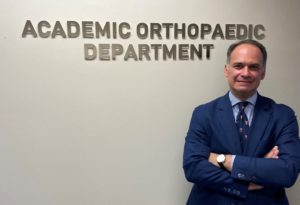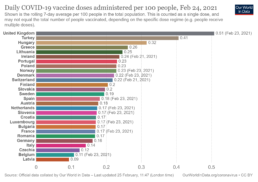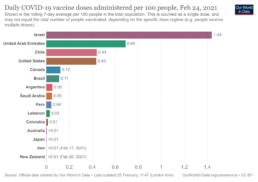EHS Secretary General, Professor Eleftherios Tsiridis
 The pandemic continues to bring us together although we are physically kept apart, through a year-long surge in online webinars and learning across all areas of society. There is talk of travel resuming as the vaccine roll-out takes place globally, but volatile discussions about vaccine-passports and discrimination issues may take a long time to resolve. However, we must remain positive and remember that the summertime is approaching and warmer weather – as we saw last year – will have a positive influence, alongside the vaccine, on crushing the spread of the virus.
The pandemic continues to bring us together although we are physically kept apart, through a year-long surge in online webinars and learning across all areas of society. There is talk of travel resuming as the vaccine roll-out takes place globally, but volatile discussions about vaccine-passports and discrimination issues may take a long time to resolve. However, we must remain positive and remember that the summertime is approaching and warmer weather – as we saw last year – will have a positive influence, alongside the vaccine, on crushing the spread of the virus.
The possibility of “one dose” vaccines, nasal sprays and oral vaccinations are all good news for a massive roll-out across the globe. This month, for a more positive view on the situation, we present data from “Our World In Data” of Daily COVID-19 Vaccine Doses Administered per 100 People (February 24th), below, from the Oxford Martin School’s Programme on Global Development, University of Oxford.
Finally, below we have the Diary of an Orthopaedic Surgeon facing COVID-19 in Bulgaria, from our active EHS Member, Prof Plamen Kinov. Please contact the EHS Secretarial Office via our Membership Secretary (samstokesehs@gmail.com) with reports on the COVID-19 developments in your area which you would like to share directly with our fellow hip surgeon members. Thank you.
COVID-Experience of a hip surgeon in Bulgaria, by Plamen Kinov

In December 2019, the outbreak of the global pandemic caused by a novel coronavirus named SARS-CoV-2 created unprecedented global health emergency as declared by WHO. At first, it seemed that orthopaedic surgery will not be greatly affected by the COVID-19 pandemic. However, since then substantial changes occurred in the health care system in Bulgaria disrupting clinical practice and preventing patients with end stage bone and joint diseases from having adequate care. The pandemic drained most of the available resources and stopped or greatly reduced non-emergent surgical treatment and medical care.
Specific recommendations and routines were implemented in order for the orthopaedic surgeons not to be infected by the new virus, or to prevent spread of infection if surgeons become infected. This included use of special protocols for treatment of inpatients as well as outpatients. Resources were relocated and clinical units including orthopaedic departments were transformed into COVID-19 units. Many surgeons had shifted from their routine orthopaedic work to COVID-19 patient management.
The surgical activity was reduced to treating only emergencies for a couple of months during the lockdowns in spring and autumn of 2020. In the period between lockdowns as well as afterwards surgical activity was reduced by more than 50%. This led to postponement or denial of operative treatment for many patients with orthopaedic diseases.
The impact of the Covid pandemic was not only on the treatment of patients but also on orthopaedic surgery education. During the two lockdowns, a shift to online training for medical students occurred with the use of the widely spread new technologies for communication. Only practical and theoretical exams were performed live. This provoked a lot of apprehensions and strain, discussions among parties involved. New ways and methods were established with the aim of improving the quality of education. However, orthopaedic trainees attended full-time the working routine. Many of them volunteered to COVID-19 units. Combined with the lower burden of operative activities as well as with the new demands during the transformation of surgical wards for treatment of COVID-19 patients this lead to a delay in orthopaedic residents’ education. The orthopaedic curriculum was changed and many programmes were postponed or rescheduled. On the other hand, new programmes and opportunities for work and development were established. The stretch caused by the global pandemic enabled the finding of hidden resources and an optimized allocation of the workforce and equipment. Adaptation of education programmes was necessary to reflect the demands of the organization changes.
All of the measures enlisted helped control the spreading of coronavirus pandemic in hospitals and turn them into safe places. Due to the control measures and restrictions in certain areas of life the pandemic is now under control in Bulgaria. However, with the new information about mutation changes in COVID-19 we are determined to keep the new regulations and measures and to further control the corona virus spread. We, the Bulgarian orthopaedic surgeons, have the mission of providing best care for our patients and we are also strongly determined to control the pandemic in the best possible way.



